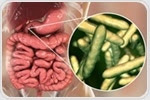 |
| |  The primary metabolites include polysaccharides, proteins, nucleic, and fatty acids; while the secondary metabolites are low molecular weight (MW<3000) compounds. The secondary metabolites may have antimicrobial, anti-tumour, or anti-viral properties. Non-antibiotic microbial metabolites are often bioregulators or biochemical modulators. The primary metabolites include polysaccharides, proteins, nucleic, and fatty acids; while the secondary metabolites are low molecular weight (MW<3000) compounds. The secondary metabolites may have antimicrobial, anti-tumour, or anti-viral properties. Non-antibiotic microbial metabolites are often bioregulators or biochemical modulators. | |
|
| |  Required for the transport and metabolism of lactose in Escherichia Coli (E. coli).The lactose operon or lac operon consists of three structural genes namely lacZ, lacY, and lacA that encode proteins involved in lactose metabolism as well as several regulatory genes. Required for the transport and metabolism of lactose in Escherichia Coli (E. coli).The lactose operon or lac operon consists of three structural genes namely lacZ, lacY, and lacA that encode proteins involved in lactose metabolism as well as several regulatory genes. | |
|
| |  Staphylococcus aureus bacteria are pathogens to both man and other mammals. They are gram positive bacteria that are small round in shape (cocci) and occur as clusters appearing like a bunch of grapes on electron microscopy. Staphylococcus aureus bacteria are pathogens to both man and other mammals. They are gram positive bacteria that are small round in shape (cocci) and occur as clusters appearing like a bunch of grapes on electron microscopy. | |
|
| |  Dysbiosis is a condition wherein there is an imbalance in the bacteria found in the gut. As a result, it will cause symptoms of digestive disturbance. These symptoms include diarrhea, constipation, bloating, and indigestion, among others. Dysbiosis is a condition wherein there is an imbalance in the bacteria found in the gut. As a result, it will cause symptoms of digestive disturbance. These symptoms include diarrhea, constipation, bloating, and indigestion, among others. | |
|
| |  Life in space is of interest to scientists because on Earth, microbes are sometimes the only living organisms found in extreme conditions such as very high or low temperatures, high salt concentrations, high levels of radiation, or limited nutrients in the environment. Life in space is of interest to scientists because on Earth, microbes are sometimes the only living organisms found in extreme conditions such as very high or low temperatures, high salt concentrations, high levels of radiation, or limited nutrients in the environment. | |
|
| |  Dysbiosis is a condition caused by an imbalance in the bacterial community (microbiome) of the human gut. Dysbiosis disrupts the ecoystsem of the gut, resulting in symptoms such as diarrhea, constipation, bloating, and indigestion, among others. Dysbiosis is a condition caused by an imbalance in the bacterial community (microbiome) of the human gut. Dysbiosis disrupts the ecoystsem of the gut, resulting in symptoms such as diarrhea, constipation, bloating, and indigestion, among others. | |
|
|
|











































No hay comentarios:
Publicar un comentario